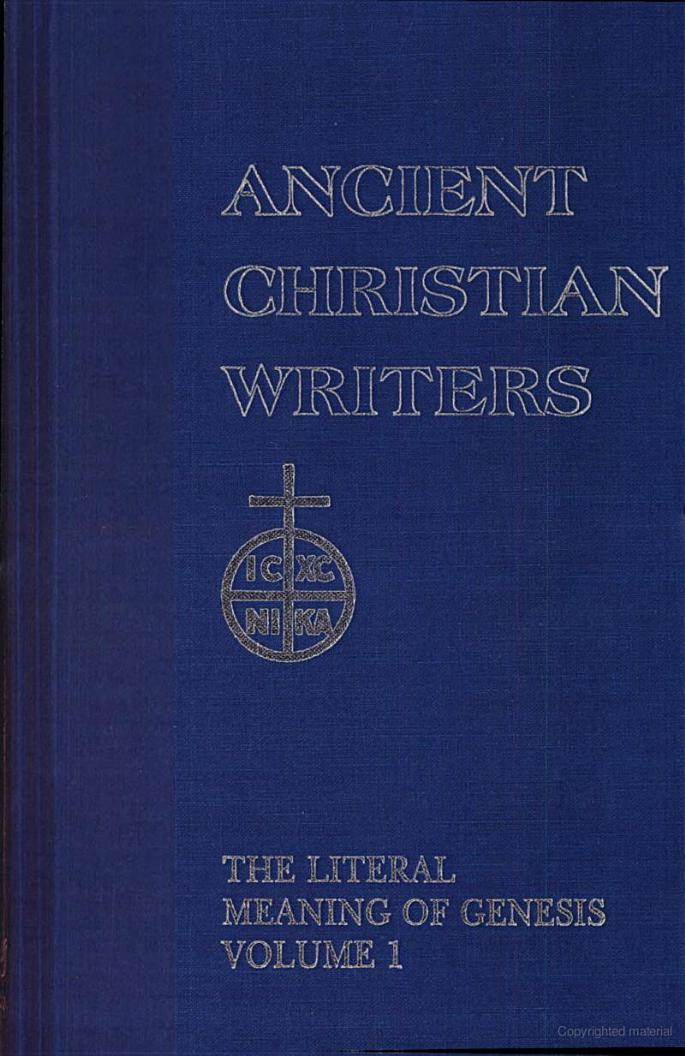 I don't remember where I found out about this book, but it was very interesting to read, considering it was written in the late 300's AD. The Literal Meaning of Genesis Vol.1 by Augustine of Hippo is a fascinating book. It's valuable to learn what people in the 4th Century understood about the nature of the universe, solar system and the earth. I realize that most people today believe in The Myth of the Flat Earth, which suggests that everyone before Columbus believed the earth was flat, and likely a square, but this is simply not true. In this book, Augustine demonstrates that the earth is arguably spherical, and may rotate around fire, and clearly says that some of the stars are larger than the Sun. Educated individuals had believed in some sort of spherical earth and posited a heliocentric model at least as early as the 5th century B.C. So Augustine clearly employs these arguments in this commentary on Genesis.
I don't remember where I found out about this book, but it was very interesting to read, considering it was written in the late 300's AD. The Literal Meaning of Genesis Vol.1 by Augustine of Hippo is a fascinating book. It's valuable to learn what people in the 4th Century understood about the nature of the universe, solar system and the earth. I realize that most people today believe in The Myth of the Flat Earth, which suggests that everyone before Columbus believed the earth was flat, and likely a square, but this is simply not true. In this book, Augustine demonstrates that the earth is arguably spherical, and may rotate around fire, and clearly says that some of the stars are larger than the Sun. Educated individuals had believed in some sort of spherical earth and posited a heliocentric model at least as early as the 5th century B.C. So Augustine clearly employs these arguments in this commentary on Genesis.
Augustine's book is an attempt to discern what is the literal meaning of Genesis, but his conclusions are primarily symbolic and Platonic. He believes there is only one day of Creation that has occurred six times upon itself, and that god created formless matter in Genesis 1's prologue that became formed in Genesis 2. Augustine is writing in a culture that views Creation in terms of Forms (rations) as Plato taught, but he also defines these forms as being a part of "God's Intellect" rather than something outside of God. Much of Augustine's understanding of the solar system and universe is remarkably accurate and similar to today, but the notable regression was Augustine's understanding of elements. He believed in an Earth/Fire/Water/Sky dichotomy of basic elements but still understood some elements such as water being lighter than other earth elements such as oil, and how both are heavier than air.
Overall, I learned the most about the way the early church fathers understood creation. It is remarkable how many of them held a symbolic interpretation of Genesis, but overall, this book is only 207 pages with lots of notes, and I easily read it in a few day. The book asks more questions than it answers, which Augustine admits in his preface, but ultimately is is interesting. He even discussed the Genesis 2:5 verse, apropos "Because It Had Not Rained" verse that Meredith Kline had made famous.
I would be a fool to give any of Augustine's writings a negative grade, so I do recommend it for understanding how our Church Fathers viewed the world. I only read Volume 1, but will not likely read Volume 2. Augustine would have been greatly helped by modern science, especially cosmology, and star formation, as well as the periodic table.



Leave a comment